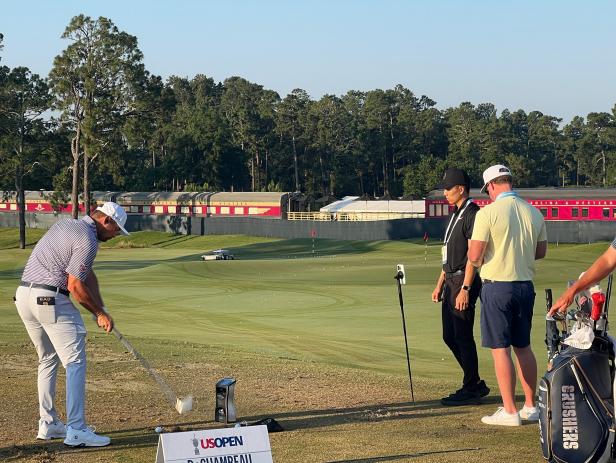Golf
U.S. Open 2024: The state-of-the-art golf swing tech Bryson DeChambeau is using, explained

PINEHURST, N.C.— The Bryson DeChambeau Show is the most popular show in golf these days. You can watch it for free on YouTube, or you can purchase a ticket to see it live and in person at a driving range near you. Each ticket comes with admission to a golf tournament, which this week is the 2024 U.S. Open.
Bryson DeChambeau kept the show rolling at Pinehurst, heading straight to the range after his one-under 69 in his second round. A crowd assembled to watch Bryson bash drivers into the distance for more than an hour in 92-degree heat.
To the passive observer, each drive was a sight to behold: A missile high and far into the distance. But Bryson wasn’t impressed. Forget that he was four under for the tournament, the best of any major winner in the field. Bryson is at his best when he has a problem to solve. This week, it’s his driver.
Somewhat surprisngly, DeChambeau ranks T-55 in SG: Off-the-Tee through two rounds. He knows the problem, and the solution. The question is if he can resolve it in time to lift a trophy in two days.
With the help of two of golf’s most innovative technologies, he just might.
You’ll also notice a Foresight QuadMAX on the ground next to the balls Bryson is hitting. That, too, is measuring the result of each of Bryson’s shots.
As first reported by Golf Digest, the two companies formed a partnership late last year, and this is an example of that connection coming together: Foresight tracks what happens to the golf ball; SportsBox AI tracks what happens with the body; the AI correlates the two pieces of data to find trends.
What does that mean? It means that when Bryson hits a good shot, he knows what, specifically happens in his golf swing. The same applies for when he hits a bad shot.
Bryson started using this combined tech last week, at LIV Golf Houston, which is where he identified the problem: Bryson’s recent miss of the tee has been a block to the right—a shot that starts right and, rather than curving back left, stays out to the right.
After analyzing those miss-to-the-right swings, DeChambeau’s coach, Golf Digest No. 9-ranked coach Dana Dahlquist, uncovered something interesting.
“The center of Bryson’s pelvis moves about an inch more towards the target on those swings,” he says. “That creates more side bend, which prevents his ability to release his hands.”
Because the upper and lower bodies are connected via the spine, the more your hips slide past the ball and towards the target, the more it tilts the upper body back. You can learn more about that in the video below, and Bryson was doing that too much.
Dahlquist found via the technology that on Bryson’s idea right-to-left draw drives—the ones that started to the right, and curves back left—there was about an inch less side-to-side movement. In exchange, his pelvis lifted about an inch more up towards the sky.
“His feels are more that he can turn over his arms, but it’s the pelvis movement that allows him that full release,” Dahlquist says. “His verticals improved, he has less side bend, which allows him to square the face easier.”
One inch up instead of one inch across. Add in a bit of practice, and it could be the recipe for another U.S. Open victory.










